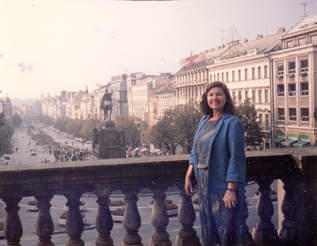 Sherrill at top of Wenceslas Square
Sherrill at top of Wenceslas Square On the train from Vienna, we'd shared a compartment with a smug Swiss and a self-conscious Pole in a badly made suit that looked as if its seams would leap apart at any moment. Between Austria and Czechoslovakia, the train stopped twice, once on each side of a viciously fenced no-man's land, so officials could check documents, scowl, and intimidate. Each time, the miserable Pole looked as if he'd melt in a puddle of fear and despair, but eventually the train lurched on its way with him still clutching the arms of his seat.
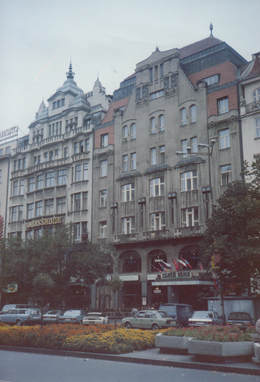
Finally, Sherrill spied a basement place down several steps from the street—a cafe for local workers and their families. Even then we had to wait until we could share a table with a Czech family. They stared, but weren't unfriendly. The menu was faded and stained, but it didn't matter because the waiter told us that the only thing left was Weiner schnitzel and potatoes. Later, when the waiter brought the bill I discovered under a tidily mended napkin an offer to change money, but I had no doubt that if I tried it Big Brother would swoop down. I'd read The Trial and knew very well that all of us are guilty until proven otherwise.
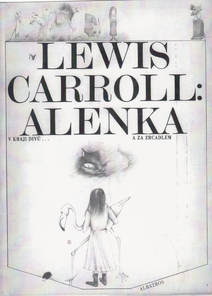
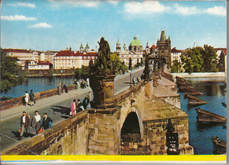 Charles Bridge, Prague
Charles Bridge, Prague 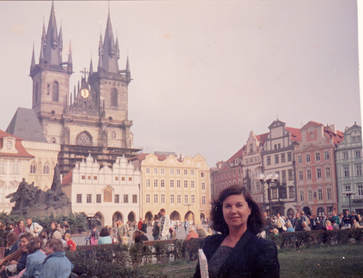 Sherrill, Old Town Square, Prague
Sherrill, Old Town Square, Prague "We'll need a reservation. I saw a little sign on the door."
"Get the desk clerk to call."
Together, we walked up to him. Slipping him a tip, I asked him to call for us.
"Impossible."
"Then we'll eat at the French Restaurant here," Sherrill told him, although we had the impression that it was reserved for guests more important than mere tourists.
"Impossible," he repeated.
"One or the other," I said.
He didn't like the ultimatum, but we stood there, waiting. Finally, he said that he'd see what he could do. Clearly, he didn't want to return the tip. A while later, he called up to our room. A table for us had been located in hotel's French restaurant. That evening, we found ourselves at a small table wedged between a flamboyantly dressed ballet troop from the Soviet Union and some stout Czech bureaucrats.
"This can't go on," Sherrill said.
As things turned out, it didn't—and it didn't take long. It was scarcely more than a year until the "velvet revolution."
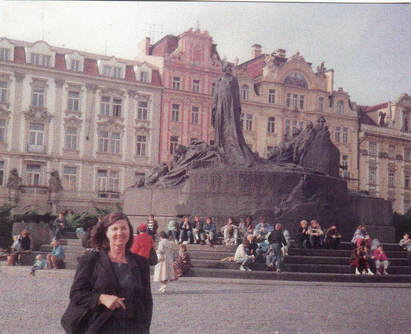 Sherrill & statue of Jan Hus, symbol of discontent, Old Town Square, Prague
Sherrill & statue of Jan Hus, symbol of discontent, Old Town Square, Prague "Train leaving early," he said. "Different station." He glanced around. "Where your woman?" Sherrill stood up. I thrust some currency into his hand. "Go to subway--there," he said. "Get on train to...." He wrote a name on a scrap of paper. "Go three stops." He held up three short fingers. "Hurry!"
Shouting a thanks, grabbing our suitcases, we rushed down the stairs to the subway, jumped on a train, counted stops, jumped off, looked at the board there for a platform, ran to it, and just as the train to Vienna started to move leaped onto it. Once we caught our breath, we walked through the car until we found a place to sit and calm down. Eventually, a conductor verified that we were, in fact, headed to Vienna.
Life in the old Eastern Block. The good old days.
To be continued....
If you enjoy these posts, why not explore the rest of my website, too? Just click on the buttons at the top of the page and discover where they take you—including to several complete short stories and excerpts from my novels. Please pass them on to anybody else you think might enjoy them.
You also might enjoy reading the new bargain-priced e-book of my novel, The Night Action. It has been called the last great novel of an past era. "The novel careens around the night spots of San Francisco's North Beach and the words seem to fly off the page in the style of Tom Wolfe or the lyrics of Tom Waits." The book is available at Amazon and Barnes and Noble. Click on the title for the link.
 RSS Feed
RSS Feed